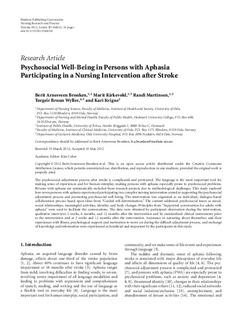Psychosocial Well-Being in Persons with Aphasia Participating in a Nursing Intervention after Stroke
Peer reviewed, Journal article
Permanent lenke
http://hdl.handle.net/11250/134466Utgivelsesdato
2012Metadata
Vis full innførselSamlinger
Originalversjon
Bronken, B. A., Kirkevold, M., Martinsen, R., Wyller, T. B., & Kvigne, K. (2012). Psychosocial Well-Being in Persons with Aphasia Participating in a Nursing Intervention after Stroke. Nursing Research and Practice, 1-14.Sammendrag
The psychosocial adjustment process after stroke is complicated and protracted. The language is the most important tool for
making sense of experiences and for human interplay, making persons with aphasia especially prone to psychosocial problems.
Persons with aphasia are systematically excluded from research projects due to methodological challenges. This study explored
how seven persons with aphasia experienced participating in a complex nursing intervention aimed at supporting the psychosocial
adjustment process and promoting psychosocial well-being. The intervention was organized as an individual, dialogue-based
collaboration process based upon ideas from “Guided self-determination.” The content addressed psychosocial issues as mood,
social relationships, meaningful activities, identity, and body changes. Principles from “Supported conversation for adults with
aphasia” were used to facilitate the conversations. The data were obtained by participant observation during the intervention,
qualitative interviews 2 weeks, 6 months, and 12 months after the intervention and by standardized clinical instruments prior
to the intervention and at 2 weeks and 12 months after the intervention. Assistance in narrating about themselves and their
experiences with illness, psychological support and motivation to move on during the difficult adjustment process, and exchange
of knowledge and information were experienced as beneficial and important by the participants in this study.
Beskrivelse
This article can also be read here: http://www.hindawi.com/journals/nrp/2012/568242/
